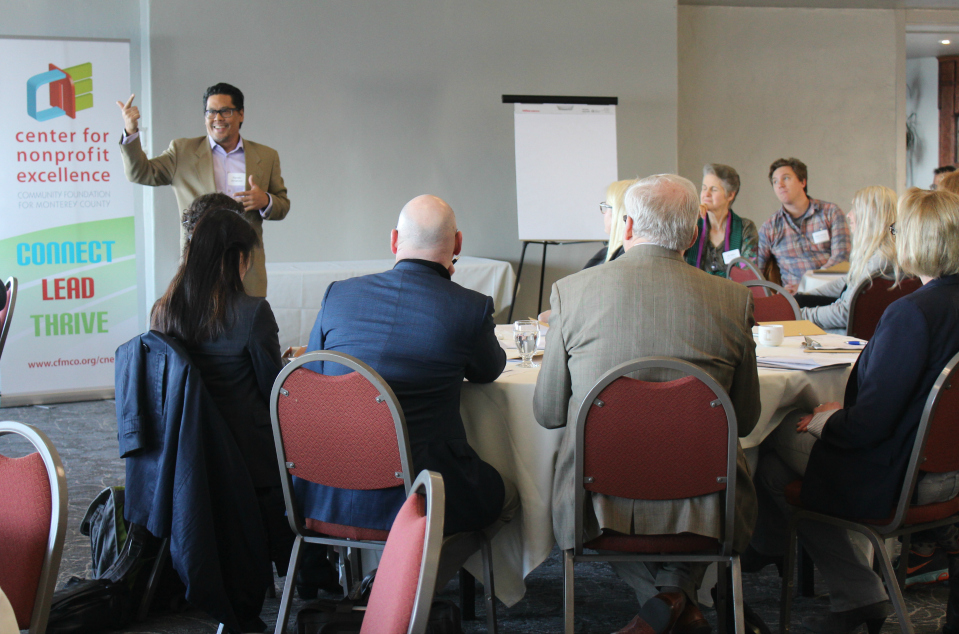
Sharing Wisdom – the ED Learning Community
by Susie Polnaszek, Program Officer, Center for Nonprofit Excellence (CNE)
A monthly meeting of Executive Directors in a Learning Community allows a small group of nonprofit executives to built trust and offer each other supportive advice, ideas, resources and encouragement. The 2017 group shared their reflections with CNE’s Susie Polnaszek, and registration for the 2018 group is now available.
These EDs are some of the hardest working people I know. They are dedicated beyond belief to their work and the people they serve.” – Karen Csejtey, 2017 Learning Community Facilitator
Sharing Tips & Staying Connected
In addition to moral support, the 2017 participants “were able to share tips and referrals on vendors, insurance, CPAs, equipment purchases, consultants for specific projects, great websites or apps, for example,” adds Clare Mounteer, ED of Monterey County Rape Crisis Center.
The group suggested creating an email listserv as a way to broaden opportunities for communicating and sharing directly among EDs. As a result, CNE developed a countywide email listserv for nonprofit executives to learn from each other and not re-invent the wheel. Email cne@cfmco.org to join the email list and start participating.
Resources for Executive Directors
While it can be hard to make time to recharge and reflect with fellow executives, it is so rewarding. Some in the 2017 Learning Community felt empowered to seek out further support such as one-on-one executive coaching or attending the Nonprofit Executive Retreat in February. Read about more resources for reflection and leadership resilience that came out of the retreat.
Board Support for Nonprofit Leaders
Nonprofit boards can go a long way to recognize and show support for their executive leaders, as highlighted in this article from Governance Matters.
1. The board president/chair can play an important role in maintaining harmony and productivity.
2. Leaders can agree to disagree constructively, which can build trust and respect.
3. Strong boards have a thoughtful annual process to evaluate the executive director based on mutually agreed-upon goals. And the board goes through a self-evaluation process annually to help stay focused on what is most important.
4. Board members make time for explicit discussions about board roles, especially during times of transition.
Read more: Executive Director Conflict Article (source: www.boardcoach.com) or in CNE’s Board Transformation Toolkits.
Join the 2018 ED Learning Community
Series dates: 4/20, 5/18, 6/15, and 7/20/18
 The 2018 ED Learning Community is designed specifically for those newest to the executive role (3 years or less of experience as an ED) to build confidence and share best practices in a fun, relaxed atmosphere. The four-month series, facilitated by Laura Segura, ED of Monarch Services, begins on April 20, 2018 at the Community Foundation for Monterey County, 945 S. Main Street, Suite 208, Salinas. Locations alternate between Salinas & Monterey. The cost is $60. Space is limited and advance registration required. Attendance required at all 4 sessions.
The 2018 ED Learning Community is designed specifically for those newest to the executive role (3 years or less of experience as an ED) to build confidence and share best practices in a fun, relaxed atmosphere. The four-month series, facilitated by Laura Segura, ED of Monarch Services, begins on April 20, 2018 at the Community Foundation for Monterey County, 945 S. Main Street, Suite 208, Salinas. Locations alternate between Salinas & Monterey. The cost is $60. Space is limited and advance registration required. Attendance required at all 4 sessions.
